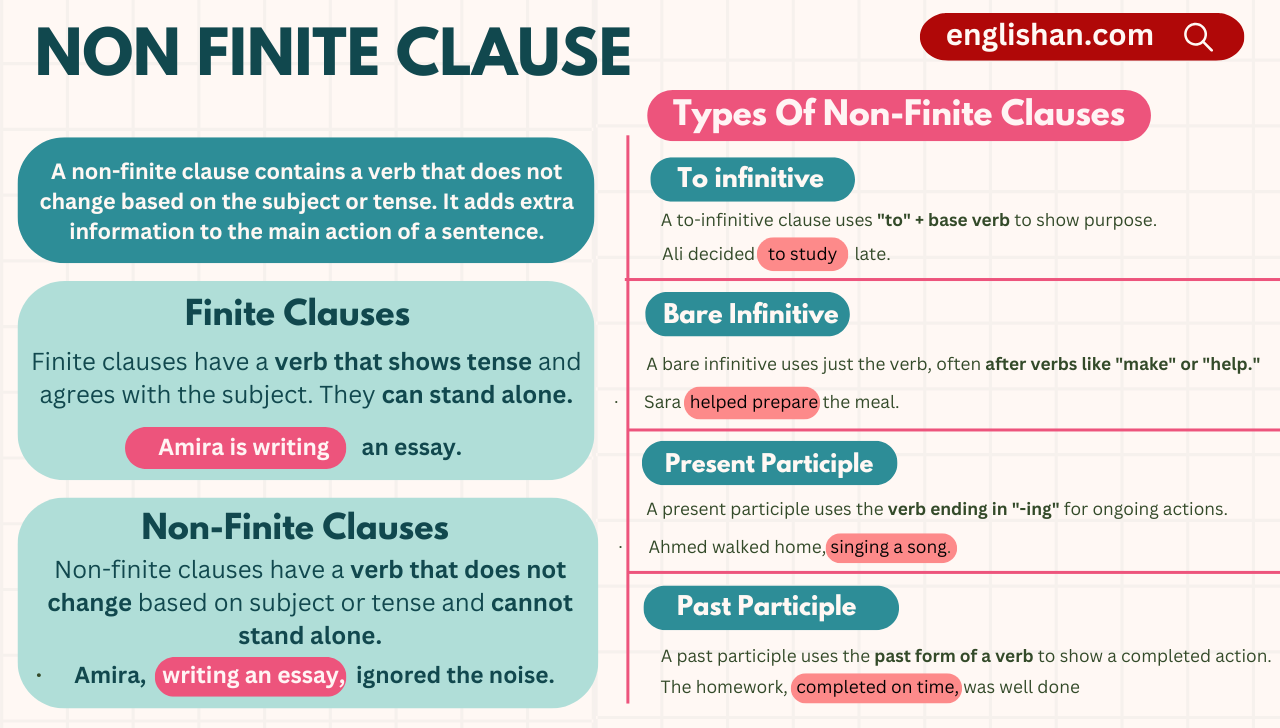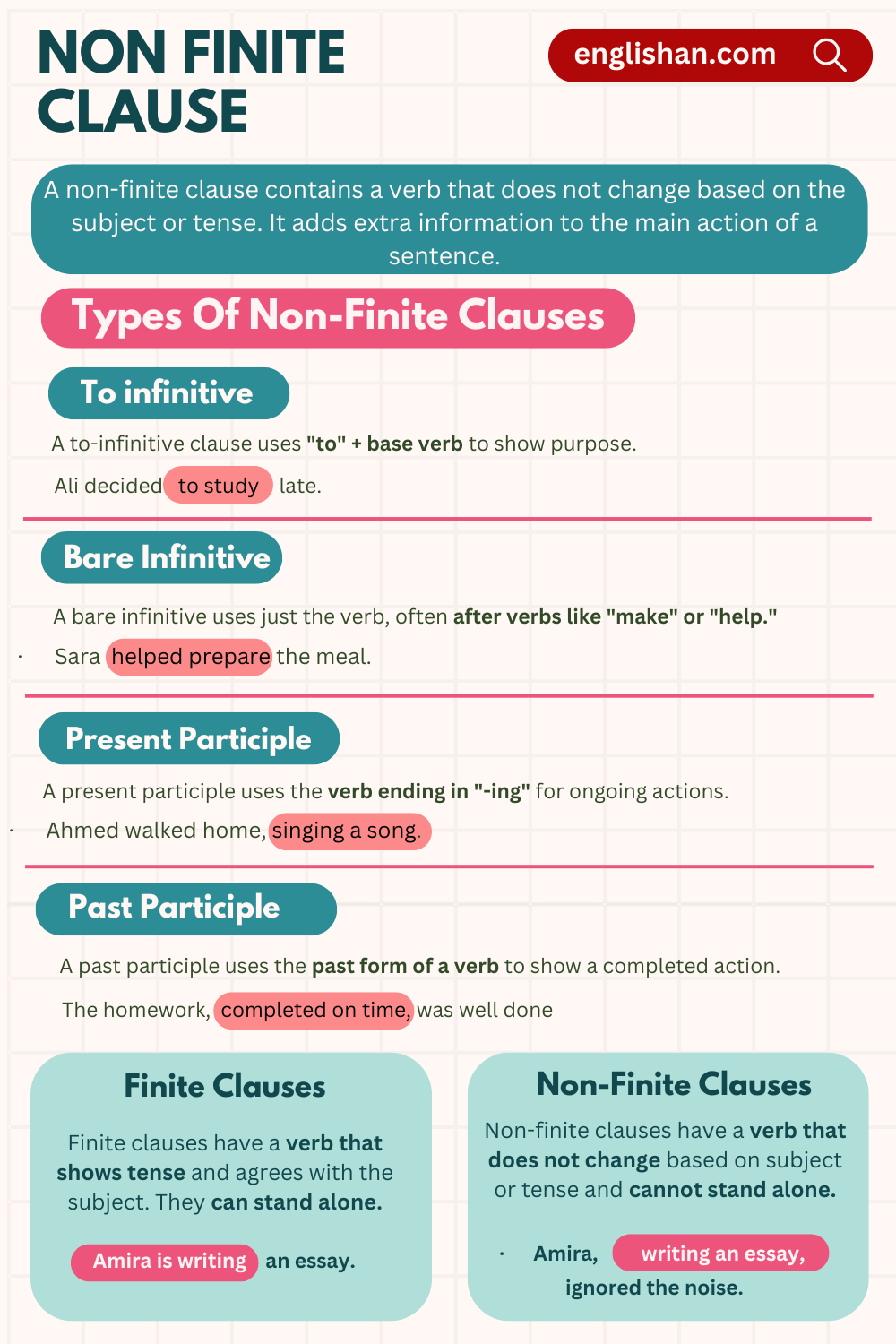Contents
In English, a non-finite clause is a kind of phrase that helps give more information in a sentence. Non-finite clauses are unique because their verbs do not show tense or subject agreement. This means they don’t tell us who did something or when it happened. This type of clause is useful in making sentences more detailed without adding too many words. In this guide, we’ll look at what non-finite clauses are, their types, and see simple examples to understand how they work.
A non-finite clause is a group of words that includes a verb, but that verb doesn’t act like most verbs do. In non-finite clauses, the verb doesn’t change based on the subject (who does the action) or the tense (when it happens). Instead, these clauses provide extra information about something in the main clause of the sentence.
For example:
To watch the movie, Sarah arrived early.
Here, “to watch the movie” adds information to the main action “arrived.”
Types of Non-Finite Clauses
Non-finite clauses come in four main types, depending on the verb form used: to-infinitive, bare infinitive, present participle, and past participle. Let’s explore each one.
1. To-Infinitive
The to-infinitive clause uses “to” plus the base form of a verb (like “to play,” “to read,” etc.). This type of clause often explains purpose or intention.
Example:
- Ali decided to study late.
Here, “to study late” explains what Ali decided to do.
2. Bare Infinitive
The bare infinitive clause uses just the base form of a verb without “to.” It commonly follows verbs like “make” or “help.”
Example:
- Sara helped prepare the meal.
“Prepare the meal” shows what Sara helped with, without needing the word “to.”
3. Present Participle
A present participle clause uses a verb ending in “-ing.” It describes an action happening at the same time as the main action.
Example:
- Ahmed walked home, singing a song.
In this sentence, “singing a song” tells us what Ahmed was doing while walking.
4. Past Participle
A past participle clause uses the past participle form of the verb (like “written,” “broken,” “prepared”). It often describes a completed action or a state.
Example:
- The homework, completed on time, was well done.
Here, “completed on time” provides extra information about the homework.
Finite vs. Non-Finite Clauses
It’s helpful to know the difference between finite clauses and non-finite clauses:
- A finite clause has a verb that changes based on the subject and tense. It gives complete information.
- A non-finite clause has a verb that does not change based on the subject or tense. It adds information without needing tense or subject agreement.
Finite Clause Example:
- Amira is writing an essay. ✅
Non-Finite Clause Example:
- Amira, writing an essay, ignored the noise. ✅
In the first example, “is writing” is in present tense and matches the subject “Amira.” In the second example, “writing an essay” adds detail without showing a tense.
Why Are Non-Finite Clauses Subordinate?
They are always subordinate because they rely on the main clause to make sense. They add extra information but can’t stand alone as a complete thought.
Example:
- To finish her assignment, Layla stayed up late.
“To finish her assignment” explains why Layla stayed up late. It needs the main clause “Layla stayed up late” to make sense.
Non-Finite Clauses as Relative Clauses
Sometimes, non-finite clauses can replace relative clauses to make sentences shorter.
Example:
- The teacher chosen for the award is very kind.
Here, “chosen for the award” acts like a relative clause (it could be “who was chosen for the award”) but is shorter and simpler.
Key Points
- Non-finite clauses contain verbs that do not change for tense or subject.
- They come in four main types: to-infinitive, bare infinitive, present participle, and past participle.
- Non-finite clauses add extra information to a main clause without making it a complete sentence.
Summary
Non-finite clauses are an easy way to make sentences richer in meaning. By learning to use the to-infinitive, bare infinitive, present participle, and past participle forms, you can make your sentences more interesting and detailed. They are easy to use and can make your writing more engaging and fluent!
Read More




